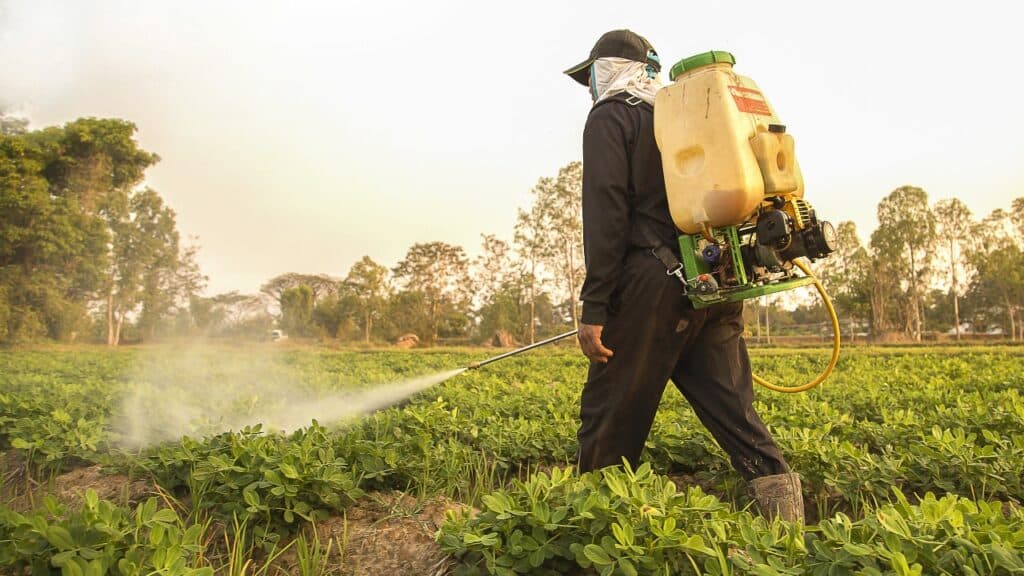Paraquat lawsuit updates & eligibility

If you worked with paraquat in a commercial setting and were later diagnosed with Parkinson’s disease, you may be able to take legal action. Time to join the paraquat lawsuit may be limited. Fill out the form to see if you qualify.
Studies have linked paraquat, a herbicide commonly used by farmers and agricultural workers, to an increased risk of Parkinson’s disease — a progressive neurological condition with no known cure.
As a result, paraquat manufacturers are facing thousands of lawsuits claiming they knew about the risks but failed to warn the public or recall the product. For those who were diagnosed with Parkinson’s after repeated exposure, these paraquat lawsuits may offer compensation for medical expenses, lost wages, ongoing care, and other damages.
If you or a loved one was diagnosed with Parkinson’s disease after working with paraquat, you are invited to share your story using the confidential form on this page. A legal representative will review your information and determine if you are eligible to file a paraquat lawsuit.
Do you qualify?
To join the paraquat Parkinson’s disease lawsuit, you must meet the following criteria:
- Direct and frequent exposure to paraquat or brand-name Gramoxone while using the product at work, such as mixing, spraying or flagging the herbicide.
- Medical documentation of a Parkinson’s diagnosis.
- Proof that the product was purchased using a commercial license. In other words, you or the person who purchased it did not buy it at a retail store.
Time may be limited to file a paraquat lawsuit and seek compensation through a proposed settlement deal reached in early 2025. Fill out the form now to see if you qualify.you qualify.
Fill out the form on this page for more information.
The law firms responsible for the content of this page are: DiCello Levitt Gutzler; Chicago, IL; 312-214-7900; dicellolevitt.com and LegaFi Law LLC (an Arizona law firm), 888-4-LegaFi, www.legafi.com.
2025 Paraquat lawsuit updates
December 2025: Reports indicate Syngenta and Chevron are finalizing a global settlement framework to resolve thousands of Paraquat Parkinson’s lawsuits. Details have not been publicly disclosed.
November 2025: The MDL judge ordered progress reports outlining settlement administration procedures and proof-of-diagnosis standards.
October 2025: The first federal bellwether trial, originally set for Oct. 14, 2025, was postponed pending settlement finalization.September 2025: Judge Rosenstengel extended the stay on MDL deadlines through at least Sept. 26, 2025, as both parties continued to finalize a global Paraquat settlement.
August 2025: U.S. District Judge Nancy Rosenstengel extended a stay on bellwether case deadlines until at least Sept. 26, 2025. This was done to give both parties more time to finalize a global paraquat settlement that could resolve thousands of claims. Also in August, Senator Cory Booker introduced the Pesticide Injury Accountability Act (S.2324), which would give individuals a federal right to sue over pesticide injuries.
June 2025: A total of 1,193 paraquat Parkinson’s lawsuits were pending in the Philadelphia County Court of Common Pleas.
April 2025: Both parties filed a joint motion confirming that a tentative global Paraquat lawsuit settlement had been reached. Syngenta also signed a letter of agreement, signalling its intention to settle a large number of Parkinson’s disease lawsuits. The details of the paraquat settlement have not been disclosed at this time.
March 2025: The Seventh Circuit Court of Appeals reviewed whether to reinstate four paraquat lawsuits that had been dismissed after the trial judge excluded key expert witnesses. These cases were previously set to be the first federal bellwether trials.
February 2025: The judge overseeing the federal paraquat MDL ordered six cases to be prepared for bellwether trials, with the first scheduled for Oct. 14, 2025, and the second for April 6, 2026. These dates may be postponed depending on the paraquat settlement outcome.
January 2025: A status conference was held on Jan. 29, 2025. Separately, the Special Master recommended dismissing 47 cases after plaintiffs failed to submit required assessment questionnaires despite multiple extensions.
December 2024: A paraquat lawsuit status conference was held Dec. 19, 2024.
November 2024: The judge overseeing paraquat lawsuits ordered plaintiffs with questionable exposure claims to provide subpoenaed records proving exposure or risk dismissal. Meanwhile, 47 U.S. lawmakers urged the EPA to ban paraquat, citing health risks and environmental contamination.
October 2024: Health advocates in Australia launched a petition to ban the herbicide due to its links to Parkinson’s disease.
September 2024: A study in Ecotoxicology and Environmental Safety linked paraquat exposure to the accumulation of α-synuclein, a protein associated with Parkinson’s disease and neurodegeneration. Additionally, the paraquat MDL added 126 new cases.
August 2024: A Canadian court certified a paraquat lawsuit, allowing individuals diagnosed with Parkinson’s after using Gramoxone to seek damages. In the U.S., the Judicial Panel on Multidistrict Litigation (JPML) reported the MDL grew by 77 cases since June, bringing the total to 5,757 pending lawsuits.
June 2024: The JPML reported 5,680 paraquat Parkinson’s lawsuits pending in multidistrict litigation.
What is Parkinson’s disease?
Parkinson’s disease is a progressive neurological disorder marked by tremors, muscle stiffness, slowed movement, and balance problems. These symptoms often affect daily activities and overall well-being.
While medications and therapies can help manage symptoms and slow progression, there is no cure for Parkinson’s disease.
The link between Parkinson’s disease and paraquat
Over the past several decades, the scientific community has begun to recognize a potential link between paraquat exposure and Parkinson’s disease. Numerous studies have shown that paraquat can damage neurons — the brain cells that degenerate in Parkinson’s — by impairing their function and triggering cell death. This evidence indicates that the herbicide is a significant environmental risk factor for Parkinson’s disease.
What is the paraquat lawsuit?
The paraquat lawsuit MDL involves more than 7,000 lawsuits filed against the manufacturers of the herbicide. Farmers, agricultural workers and others exposed to paraquat who were later diagnosed with Parkinson’s argue that manufacturers failed to adequately warn about the chemical’s health risks.
These lawsuits are currently consolidated in federal multidistrict litigation (MDL), where plaintiffs are seeking compensation for medical costs, lost wages, ongoing care and other damages. In addition to the MDL, some claims are also proceeding in state courts.
When will the paraquat lawsuits settle?
In April 2025, a joint motion was filed in the paraquat MDL indicating that a potential global settlement had been reached. There is no guarantee that the paraquat settlement will be approved by the court, but if it is, this could resolve thousands of Parkinson’s lawsuits.
How to file a paraquat lawsuit
If you believe your Parkinson’s disease was caused by exposure to paraquat, you may be eligible to take legal action. Use the form on this page to share your experience, and a legal representative will review your information and guide you through the next steps.
Fill out the form on this page to see if you qualify for a free case evaluation.
See If You Qualify
Join a Parkinson’s disease and paraquat herbicide mass tort lawsuit investigation
Filling out this form is quick and easy. It only takes a few minutes to see if you qualify.
After you fill out the form, an attorney(s) or their agent(s) may contact you to discuss your legal rights.
ATTORNEY ADVERTISING
The choice of a lawyer is an important decision and should not be based solely on advertisements.
PAID ATTORNEY ADVERTISEMENT: THIS WEB PAGE IS AN ADVERTISEMENT AND THE PARTICIPATING ATTORNEY(S) ARE INCLUDED BECAUSE THEY PAY AN ADVERTISING FEE. Top Class Actions is not a law firm, lawyer referral service, or prepaid legal services plan. We do not endorse or recommend any third-party claims processing company, lawyer, or law firm who participates in the network. We do not make any representation, and have not made any judgment, as to the qualifications, expertise, or credentials of any participating lawyer or processing group. No representation is made that the quality of the legal services or claims processing to be performed is greater than the quality of legal services or claims processing performed by other lawyers or claims processing group. The information contained herein is not legal advice. Any information you submit to Top Class Actions does not create an attorney-client relationship and may not be protected by attorney-client privilege because Top Class Actions is not a law firm. Instead, your information will be forwarded to an attorney(s) or their agent(s) or a claims processing firm for the purpose of a confidential review and potential representation if you qualify. You will only be contacted by an attorney(s) or their agent(s) in response to your inquiry if your initial information appears to qualify you for representation. If you are not contacted by an attorney(s) or their agent(s) within one week, you should consult another firm since all legal claims are subject to filing deadlines. All photos on this website are stock art and do not depict clients.












